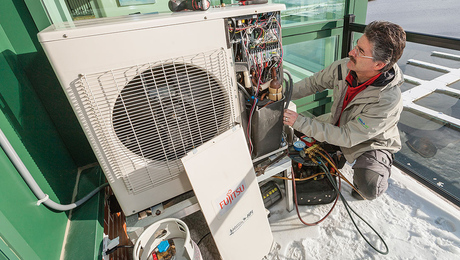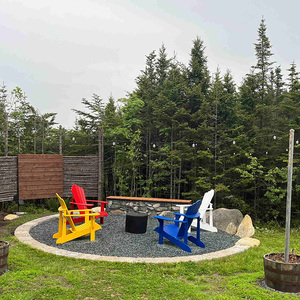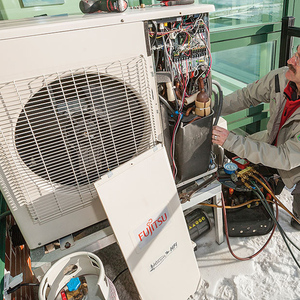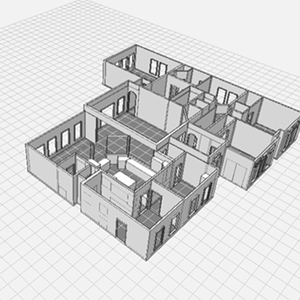Q: 100-amp service in an apartment
I recently upgraded to 200-amp service for the main 2/3 part of a house.
There is a second service which used to be split off the old 100-amp service line, which now has the 100-amp service to itself because I asked for the aerial line to remain serving it after the old main house meter was disconnected.
So….I have 100-amps to this downstairs apartment with a kitchen/bath and bedroom/livingroom.
There are two Pushmatic panels, with the upper one for the disconnect, which shows TWO 100-amp breakers side-by-side.
Below it is the service panel with pushmatic breakers serving a laundry room washer/elec dryer, kitchen elec. stove, refrigerator and the ungrounded wall outlets and lights.
My questions of the day is….
Due to time constraints I need to get this thing rented out and would like to know if 100-amp service would be adaquate for a small apartment.
Have to get a new elec stove and may install its own water heater.
So that adds up to washer/dryer, elec stove, refrigerator, and the existing wall outlets with the possibility of adding a reasonably sized water heater for the single occupancy unit.
Also, I am not sure what to make of this double 100-amp breakers in the disconnect.
I am sure the line coming to the house is rated only for 100-amps, which is why I switched to 200-amp service for the main part of the house.
Sorry to be so over-winded.
Alan



















Replies
Never mind the question about the two 100-amp breakers.
My guess is they used two single pole 100-amp breakers, so it's still a 100-amp breaker for the 220.
100 Amps should be sufficient for a small apartment. All the new construction nuts will tell you 200A minimum, and I've seen new houses with 400A, but unless your tenant is growing pot and has installed grow-lights, and is running all the burners and the oven on the stove, drying clothes in the electric dryer and running the electric water heater all at the same time, well you get the idea.
If you look in the NEC they have guidelines for counting up loads and determining what the total amperage may be.
What the heck does a single family house need a 400A panel for anyway? Whatever happened to energy conservation?
good luck. and regarding your other post, just run your new water heater off the tenant's panel. that's the easiest way to go.
Howdy, alecs
Thanks for the reply.
I guess it's possible the tenant could be baking something in the oven while washing and drying a load and maybe, maybe showering, all at the same time in preparation for having company.
Being in a University town it is likely there will be a 24/7 online connection going on as well.
Just wanting to be on the cautious side and maybe at least mention to the tenant it's probably not a good idea to be going nuts with the electrical load.
As for the water heater, yes, I will run it off the 100amp panel when it is installed. The would be the easiest in the long run.
The utility company is due for pulling cables for underground service and already told me two 200-amp rated lines will be buried.
Already have a 200-amp rated panel for when the apartment is converted to a new meter and disconnect that won't be until next year.
Thanks again,
Alan
Dryer ~6kW
Stove ~6kW
HWH ~3kW
Washer ~.5 kW
total=15.5 kW.
Assuming 85% power factor, this works out to 79 amps at 230 Volts.
Should be OK with 100 A panel, and it's very very very unlikely that all these loads would be on at full power at the same time.
Keep in mind, I'm not an electrician. Actually a mechanical engineer. And these are just back of the envelope calculations. But I still think you'd be OK. have fun. Tenants are wonderful. 8^)
Edit: for these particular loads, the power factor is going to be higher than 85%, since we're talking mostly resistance heating. So the amperage will be even less.
Edited 4/23/2003 5:27:16 PM ET by alecs
Thanks, Alecs
My younger brother is a EE and he would probably say the same thing and he's done quite a bit of rewiring himself.
Actually, he's been on me about overdoing stuff on electrical projects.
Just like to be on the safe side but sometime I lose sight of reality.
Take care,
Alan
Not that you need another person telling you 100 amps is plenty, but I own a small 2 bedroom house that I rent out. It has electric oven, water heater, washer/dryer combo, central air (heat pump), microwave, computer, big tv, yada, yada, yada... never tripped the main breaker. (don't worry it's not an FPE breaker, those never trip!!!)
playdoh -
I do appreciate hearing from folks in the real world.
Assurance based on practical experience is far more comforting then getting bugged out on "theoretically if it's this and then that" type of figuring.
Although they are going ahead and pulling a 200-amp rated service cable when the cable burial time comes, it's comforting to know I'll be ok for the time being.
I think, at least in our area, 150-amps is more common for an average sized apartment that's been upgraded or new but I haven't gone around to take a survey.
100A should be OK.
I have seen many houses with 100A services. It is always easier if the heat, WH and stove is gas but even then it depends on the tenant. Quiet people who turn off lights are unlikely to need a fraction of 100A most of the time. Their biggest use is electric heat and a hot shower. Other people like to run everything at once. In extreme cases 200A wouldn't hold them.
Odds are that any tenant worth keeping, a nice quiet one, won't have any problems. A good thing as changing this out won't be cheap.
Thank-you, 4LORN1 -
The heat is from hotwater baseboards/oil boiler.
No A/C and is not needed in the walk-out basement.
If a hotwater heater is added for it the bigger headache may be with some of the routing of the water lines, some of which runs.....UNDER THE SLAB !
I may have to run new hotwater lines between the new hotwater heater to the kitchen and bathroom.
Thanks for the reassurance, though.
Alan